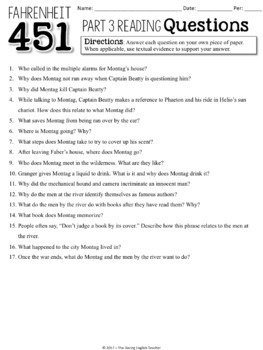

He must have taunted Montag purposefully to make him commit murder. He then comes to one sudden realization: Beatty wanted to die.He checks his stash of books he left in a bush behind the house and finds four left. As he stumbles along, Montag curses himself for being, in short, a moron.Effectively down one appendage, Montag hobbles away from the scene of his crime(s).Before it dies, it jabs its needle part of the way into his leg, rendering it numb. Montag is attacked and flames the dog mid-air.(Click the summary infographic to download.) Then he turns around to find the Mechanical Hound. Then he knocks out the two remaining firemen. Beatty laughs, obviously not taking the threat seriously.Montag points the flame thrower at Beatty – though he believes his hands, not he himself, have done it.

He tells Montag that they’ll trace it and find his friend. Beatty picks it up and hears Faber calling. Finally the Captain hits him hard enough to knock the earpiece out and into the ground.


Fire will rid him of his burdens – like Montag. Man is drawn to flame, he says, because it is perpetual motion it is the one thing man always wanted to invent but never did. Meanwhile Beatty has flicked his igniter and is admiring the beauty of the fire. Faber realizes what’s up and advises Montag to run.Montag stands around dazed that this is happening to him. Faber, through the earpiece, tries to figure out what’s going on.Montag realizes that she is the one who called the alarm. Beatty taunts Montag for a bit and Mildred runs out of the house, a suitcase in her hand, to a taxi waiting at the curb.Fahrenheit 451 fits squarely into this dystopian literary tradition. Yevgeny Zamyatin's We, George Orwell's 1984, Aldous Huxley's Brave New World, Kurt Vonnegut's "Harrison Bergeron," and Ayn Rand's Atlas Shrugged, are among the most-read dystopian novels and short stories of the past century. Rather than create ideal societies meant to serve as models for improvement, authors instead created dystopias, or nightmare societies, designed to sound a warning about modern society's problems. In the 20th century, fictionalized societies frequently took on a darker, oppressive aspect. Edward Bellamy, writing at the end of the 19th century, imagined an ideal future society in Looking Backward: 2000–1887. Plato's Republic is one of the earliest and best-known utopias, while Sir Thomas More's sixteenth century work Utopia gives the genre its name. Some authors have created utopias, or ideal states, with the intention to show how civilization might be improved. Many authors have created states and societies in their works of fiction and philosophy.


 0 kommentar(er)
0 kommentar(er)
